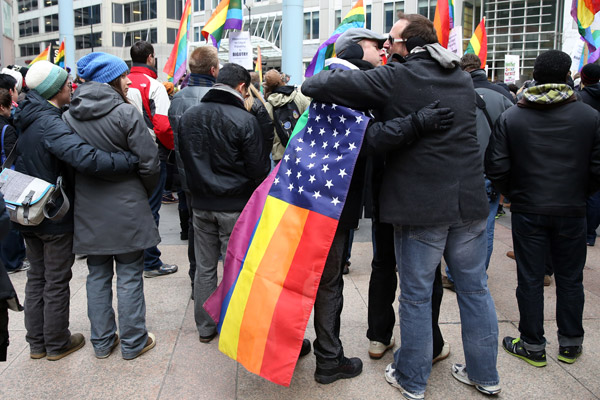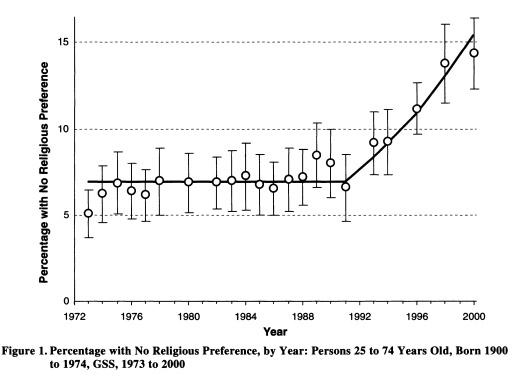
John J. Kim/Chicago Tribune
As same-sex marriage winds its way through the Illinois legislature (after seeming setbacks, it's looking a bit more likely) and the Supreme Court, John Kass speaks for the still small voice of traditional Christians in journalism, the victims of the real bigots—i.e. the repressive majority voices of equality:
No one with half a brain wants to be thought of as a bigot. But that's what I and others risk as members of a distinct and irritating minority — as traditional Christians in journalism.
It is a world of language and political symbolism, a world where ideas are often framed so that they may lead to inexorable conclusions favored by the dominant culture. In this media world, I sometimes wonder whether the word "sin" has been outlawed by the high priests of journalism for fear of offending one group or another. And I'd rather not ask.
That's okay, I'll ask.
It is true that, insofar as we have numbers for it, journalists tend to be less devoutly religious than the public at large: "the Pew Research Center for the People and the Press reported in 2007 that 8% of journalists surveyed at national media outlets said they attended church or synagogue weekly…. Pew polling of the general public found 39% of Americans say they attend religious services weekly."
This is a somewhat narrow measure of religious beliefs—more on that in a minute—but a reasonable one for traditionally devout religious ones.
But the "high priests of journalism" are something of a different story. While far from a comprehensive survey, from my readings I've found Christians (if not "traditional Christians," whatever that means) well-represented in the highest ranks of journalism. Charles M. Blow, Maureen Dowd, Ross Douthat, and Bill Keller, a substantial portion of the New York Times's high priests, identify as Christian. At the Washington Post there's E.J. Dionne, Michael Gerson (a Wheaton grad), and Marc Thiessen. The Wall Street Journal has Peggy Noonan, a devout Catholic; Daniel Henninger seems to be one as well. Fox has Bill O'Reilly; MSNBC has Chris Matthews.
At the same time, I'm hard-pressed to think of prominent atheist journalists outside of Christopher Hitchens. Not trivially, Hitchens was British, a country that has a much more rich tradition of openly heretical atheism. There are a handful in American journalism, though they don't make that big a deal about it; their ranks include the perfume critic of the New York Times, a powerful position in the hierarchy of journalism, certainly, but a circumscribed one.
Some of the above are admittedly ambivalent to the specific traditions they were raised in, especially Keller, Dowd, and Blow. In that sense, they're reflective of currents in contemporary religious traditions. The legendary Harvard sociologist Robert Putnam—of "bowling alone" fame—recently completed a study of religious affiliation in America, in which he found a rise of the "nones," who account for 25-30 percent of the population, a vast increase from seven percent in 1990.
And Putnam, along with co-author David Campbell, attributes this to a very specific phenomenon:
So, why this sudden jump in youthful disaffection from organized religion? The surprising answer, according to a mounting body of evidence, is politics. Very few of these new "nones" actually call themselves atheists, and many have rather conventional beliefs about God and theology. But they have been alienated from organized religion by its increasingly conservative politics.
During the 1980s, the public face of American religion turned sharply right. Political allegiances and religious observance became more closely aligned, and both religion and politics became more polarized. Abortion and homosexuality became more prominent issues on the national political agenda, and activists such as Jerry Falwell and Ralph Reed began looking to expand religious activism into electoral politics. Church attendance gradually became the primary dividing line between Republicans and Democrats in national elections.
Putnam and Campbell are very clear that the social issue of homosexuality, far more than abortion, is the primary driver of this schism: "a majority of the Millennial generation was liberal on most social issues, and above all, on homosexuality. The fraction of twentysomethings who said that homosexual relations were 'always' or 'almost always' wrong plummeted from about 75% in 1990 to about 40% in 2008."
Meanwhile, prominent religious leaders went the other way, for reasons political as much as theological: "many prominent religious leaders moved to the right, using the issue of same-sex marriage to mobilize electoral support for conservative Republicans."
They're working off the data of a fellow sociologist, Michael Hout of Berkeley, author of The Truth About Conservative Christians. In 2002, Hout and Claude S. Fischer produced a remarkable graph of people expressing no religious preference (PDF):

That's two decades of statistically insignificant change, followed by a near-tripling over less than a decade, which is pretty amazing. Notably, Hout and Fischer don't attribute this to "secularization": "only a minority appear to be 'atheist,' 'agnostic,' or 'skeptical.'" The increase in liberal political views, coinciding with the rise of the Religious Right, pushed liberals and moderates (including "moderates who lean to conservative") out of affiliation, but not out of religion.
I guess you could say that they were driven out of "a world where ideas are often framed so that they may lead to inexorable conclusions favored by the dominant culture."
It is true that this phenomenon represents a decline in "traditional" Christianity, quite literally—the departure of the faithful from their traditions, as Blow, Dowd, and Keller all describe. From personal observation, at least, this was driven by an interrogation of these traditions: applying them to logic, history, and experience, not coincidentally the foundational tenents of journalism.
And the odd specificity of the prohibition on homosexuality was, in particular, found wanting. As one of an endless list of examples, this analysis (PDF) of Romans 1:26-27 by Arland Hultgren, professor emeritus and former chair of New Testament at Luther Seminary, is exemplary, an elegant analysis based in his own translation of the text. Romans 1:26-27 is generally held up as the strongest argument in the New Testament against homosexuality, and has particular resonance coming from St. Paul.
Without going into the details of Hultgren's exegisis—and they are two hotly debated verses, so there are plenty more to choose from—he redirects the reader's attention to the New Testament's prohibitions of divorce, which are many in comparison to its passing treatment of same-gender relations: "I shall leave the matter at that, except to say that too often in matters of sexual conduct people ignore those passages of the scriptures that are clear, and yet will quote others that are less clear, as in the case of Romans 1." Skeptics looked at the inflamed turn against homosexuality among some religious traditions as other, clearer prohibitions were more quietly passed by (the sins of Sodom were pride and violence, not consensual homosexuality), and couldn't help but wonder if homosexuality's central status in the culture wars was a marriage of convenience.
And this did cast doubt on traditional Christianity, even if it was more a loss of tradition than a loss of faith. Anyone who grew up in such a faith will hardly recognize it as inexorable: the fearsome task of asking what has been outlawed, and why.


